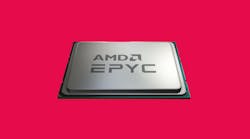AMD is trying to keep up the pace in its effort to outmaneuver Intel in the market for data center silicon.
On Monday, the Santa Clara, California-based company said that it is on track to roll out its fourth generation of EPYC server CPUs, code-named Genoa, with up to 96 cores based on its future Zen 4 architecture and the 5-nm node by early 2022. It also added another family of server CPUs to its roadmap—Bergamo—designed explicitly for cloud giants that place premiums on power efficiency and core density. It is due out in 2023.
AMD revealed the new details of its roadmap during its Accelerated Data Center event on Monday, where it also announced a range of new chips, including its latest GPU to take on Nvidia in data centers and EPYC CPUs with 3D V-Cache.
AMD is in the process of taking market share from Intel in server processors, which have become a booming market in recent years. These types of chips are highly profitable and can cost thousands of dollars each. Last month, AMD CEO Lisa Su said that its data center chip sales doubled year-over-year in its most recent quarter. On a conference call for investors and analysts, Su said the business accounts for 20% of its sales.
EPYC CPUs are now designed into data centers by ten of the world's largest hyperscale companies, AMD said. That includes all the most prominent US cloud computing giants—AWS, Microsoft, Google, IBM, and Oracle—and their counterparts in China—Baidu, Alibaba, and Tencent. AMD has also landed Meta Platforms, the new parent company of Facebook, as a buyer for its server chips, cementing its market share gains against Intel.
The company had a 10% market share of server CPUs in the third quarter, a gain of 3.5 percentage points from a year ago, according to Mercury Research. Intel commanded up to 99% of the market share in server chips in the years before its manufacturing woes.
AMD has been mounting its first major assault on Intel's dominance in more than a decade, largely due to server chips that can challenge Intel’s Xeon Scalable CPUs for data centers for the first time in a long time.
It is betting on its Genoa and Bergamo CPUs as catalysts for further growth.
AMD said Genoa will contain up to 96 cores, 32 more than its latest flagship server CPU, code-named Milan, which is based on its Zen 3 architecture. In addition, Su said Genoa will be AMD's first CPU to support DDR5 DRAM, PCIe Gen 5, and Compute Express Link (CXL), an open standard championed by Intel that acts as the interconnect between CPUs, accelerators, and memory.
AMD said that it will also have "breakthrough" memory expansion capabilities for the data center market.
Su said Genoa will be the world's fastest CPU for general-purpose computing in data centers when it comes out in the first half of 2022. It will be based on TSMC's 5-nm node, the most advanced process on the market today.
"It will extend our performance leadership at both the socket level and the per-core level," she said, adding that it is sampling now to potential customers.
AMD said Bergamo CPUs will have up to 128 cores based on a cloud-native variant of the Zen 4 architecture called Zen 4C, opening the door to higher performance per socket. Cloud computing firms value very high core counts because they make it possible for server chips to cycle through many more workloads at the same time. Cloud companies tend to rent out silicon in their colossal data centers to outsiders core by core.
Su said that the increased power efficiency and new cache hierarchy in the Bergamo's Zen 4C architecture are what will allow the company to cram more cores in the same area as its general-purpose Genoa CPUs.
The Zen 4C core uses a high-performance variant of TSMC's 5-nm node. AMD said the node will offer double the logic density and power efficiency as well as a 25% uplift in performance over the 7-nm technology node used in AMD's current line of EPYC CPUs that launched earlier in the year. The new chips will have the same memory and I/O features as Genoa and fit in the same server platforms it is building for Genoa.
Usually, AMD rolls out a single microarchitecture that it uses in both its personal computer and data center chips. But offering chips with different CPU cores could help it cover a broader range of customer needs.
The Bergamo CPU could help it repel growing competition in the data center from Ampere Computing, which has rolled out its Altra series of Arm-based server processors that scale up to 128 single-threaded cores that excel in power efficiency and core density. The startup has landed Oracle Cloud as a customer for the silicon.

